COVID-19 has changed study abroad landscape, global survey of education agents reveals
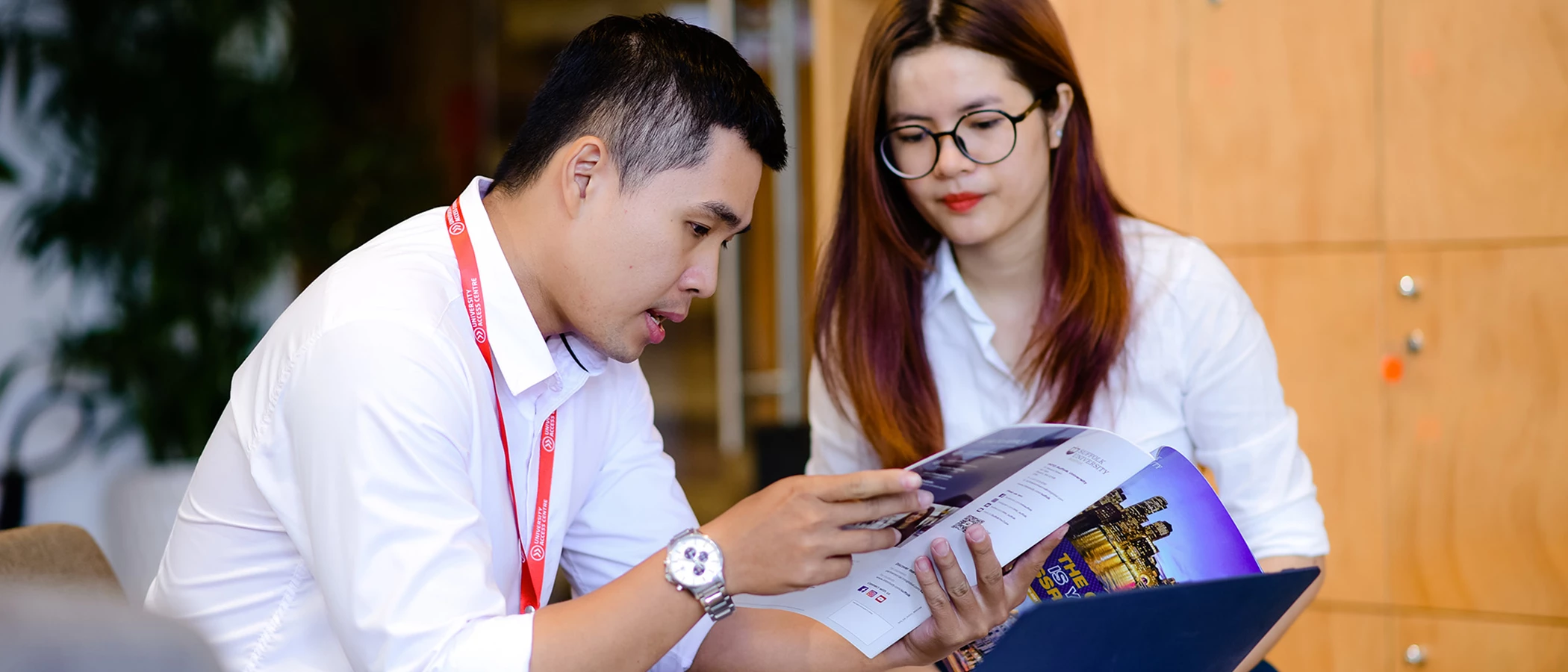
80% of education agents feel factors influencing study abroad decisions have changed due to the pandemic, with increased student and parent interest in blended delivery, financial support and career outcomes.
(LONDON / NEW YORK): Four out of five educational counsellors and agents have registered changes in the factors influencing students’ and parents’ decision-making around study abroad because of the COVID-19 pandemic, a global survey by INTO University Partnerships shows.
A total of 1,126 agents from 79 countries participated in the survey, which was carried out over the first two weeks of November 2021. Represented countries include China, India, Indonesia, Vietnam, Nigeria and Brazil.
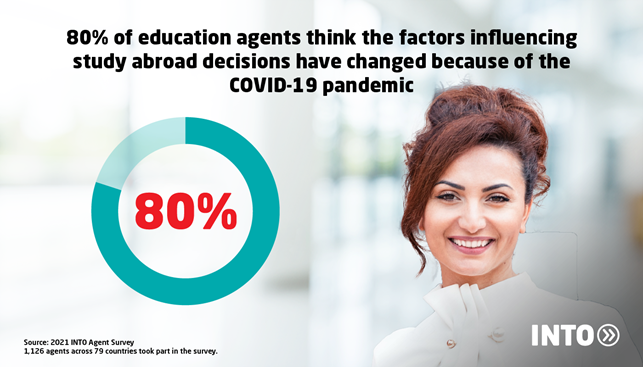
For 65% of agents, the students and parents with whom they work are increasingly price-sensitive, focusing on scholarships and other forms of financial aid as they weigh their options. At the same time, 61% note students and parents are far more focused on career outcomes than they were pre-COVID-19, and 49% say their clients demand stronger return on investment.
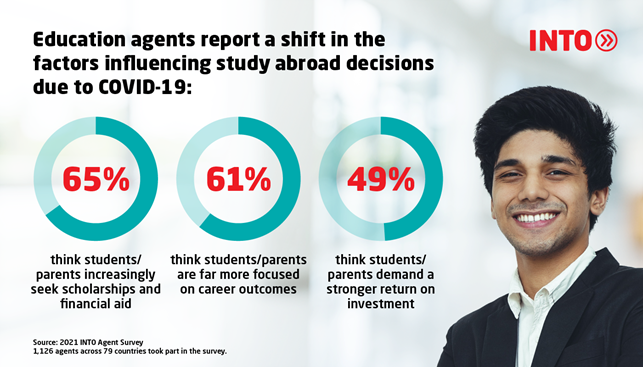
“In these findings, we once again witness certain, indelible impacts the COVID-19 pandemic has had on students worldwide. As study abroad aspirants navigate the new terrain before them, they’re counting on international education to give them every advantage toward future success. Accommodating their demands is critical to continued recovery,” said Olivia Streatfeild, CEO of INTO University Partnerships.
Virtually all agents (95%) anticipate that student demand will return to primarily face-to-face learning moving forward. However, 72% report that more students now are interested in blended delivery than in the years preceding the pandemic.
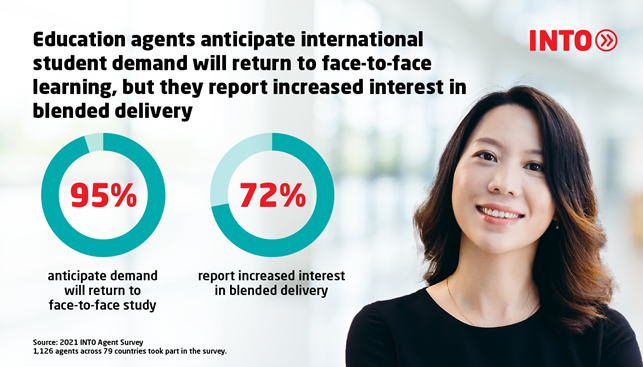
“It is a welcome news for the higher education sector that students continue to prioritise in-person study abroad experiences. Also, it is equally important to note that a significant number of students are interested in blended delivery which has emerged as a technology driven response to the pandemic. It demonstrates how critical it is for the sector to build flexibility into education delivery — and always adapt to meet students’ needs where they are,” said Ms. Streatfeild.
In addition to these changes, 45% of agents have seen some change in the subjects students want to pursue. Specifically, 24% record greater interest in computer science and related specialities in robotics and artificial intelligence (AI), while 14% indicate there is greater interest in data science and analytics.
Looking ahead, 27% of agents identify job opportunities in destination countries as the factor that will have the greatest impact on study abroad decision-making over the next five years, while 21% say it will be destination countries’ immigration policies. Responses differed considerably for agents from China, Hong Kong and Macau, 31% of whom feel future pandemics will be the top factor, and 25% of whom think it will be geo-political relations.
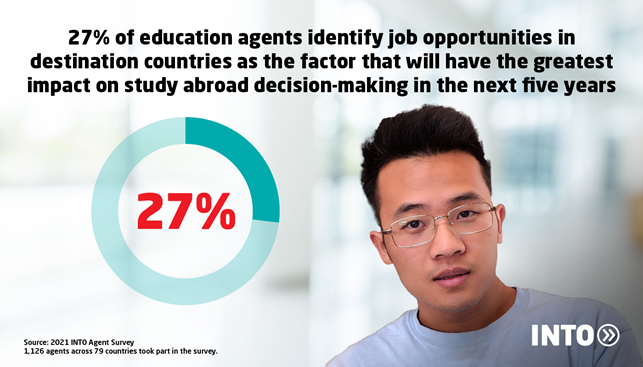
“National programmes that empower international students to live and work in their destination countries after earning degrees aren’t just nice to have — they’re essential. Not only do they enhance countries’ ability to compete for global talent, they protect the immense contributions of international students to local communities and national economies,” said Ms. Streatfeild.
Millions of students leave their home countries to study abroad annually. In 2019, 6.2 million students crossed borders for higher education. The global economic impact of international students is estimated to be in excess of US$350 billion.
Agents are most positive about the UK as a study destination across the board. An overwhelming 89% feel positive about how welcoming and safe the country is for international students, and 88% feel positive about how the UK government has handled the COVID-19 vaccine rollout.
Agent sentiment toward the US is comparatively less favourable. Just 70% feel positive about how welcoming the country is to international students, and 75% feel positive about the government’s handling of the vaccine rollout. Sentiment among agents from China, Hong Kong and Macau is worse — only 57% feel positive about the how welcoming the US is, and 64% approve of vaccine rollout there.
Globally, 81% of agents expect to send more students to the UK in the coming year, with 57% expecting that volume to be significantly greater. Compare this to the 59% who think they will send more students to the US. Only 20% expect they will send significantly more students to the US.
Highlights from the survey:
- 80% of education agents think the factors influencing study abroad decisions have changed because of COVID-19.
- 65% of education agents think students/parents are increasingly looking for scholarships and financial aid due to COVID-19; 61% think students/parents are now more focused on career outcomes, and 49% think they demand stronger return on investment
- 95% of education agents anticipate that student demand will return primarily to face-to-face study, although 72% report more students are interested in blended delivery since the start of the pandemic.
- 45% of education agents see some change in the subjects students want to pursue; 24% see increased interest in computer science, and 14% see increased interest in data science and analytics.
- 27% of education agents identify job opportunities in destination countries as the factor that will have the greatest impact on study abroad decision-making in the next five years, while 21% identify destination countries’ immigration policies as the top factor.
- 31% of education agents from China, Hong Kong and Macau think the factor that future pandemics will have the greatest impact on study abroad decision-making in the next five years is future pandemics, and 25% think it will be geo-political relations.
- 89% of education agents feel positive about how welcoming and safe the UK is for international students, and 88% feel positive about the UK government’s handling of the COVID-19 vaccine rollout.
- 70% of education agents feel positive about how welcoming and safe the US is for international students, and 75% feel positive about the US government’s handling of the COVID-19 vaccine rollout.
- 81% of education agents expect to send more students to the UK in the coming year, with 57% expecting to send a significantly greater volume.
- 59% of education agents expect to send more students to the US in the coming year, with 20% expecting to send a significantly greater volume.
Access the full report on INTO University Partnerships’ global agent survey findings here.
For media enquiries, please contact:
Davinder Kumar
VP, Corporate & Public Relations
davinder.kumar@intoglobal.com